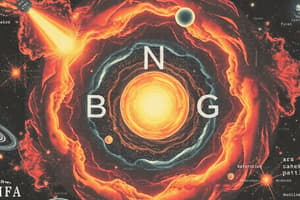Podcast
Questions and Answers
What major contribution did Edwin Hubble make to our understanding of the universe?
What major contribution did Edwin Hubble make to our understanding of the universe?
- He discovered the cosmic microwave background radiation.
- He proposed the concept of dark matter.
- He developed Hubble's Law to estimate the age of the universe. (correct)
- He formulated the theory of relativity.
What was the nature of the particle explosion hypothesized to have initiated the Big Bang?
What was the nature of the particle explosion hypothesized to have initiated the Big Bang?
- A singular particle explosion at a definite point in time. (correct)
- An explosion of dark energy at the center of a black hole.
- A quantum fluctuation in a vacuum state causing an inflationary phase.
- A collision between two neutron stars in the early universe.
Who first proposed the idea that the universe began approximately 13.7 billion years ago?
Who first proposed the idea that the universe began approximately 13.7 billion years ago?
- Albert Einstein
- Isaac Newton
- Edwin Hubble
- Georges Lemaitre (correct)
What phenomenon describes the spontaneous production and destruction of matter in the early universe?
What phenomenon describes the spontaneous production and destruction of matter in the early universe?
What did the hot dense ball that initiated the Big Bang continuously emit?
What did the hot dense ball that initiated the Big Bang continuously emit?
Flashcards are hidden until you start studying
Study Notes
The Big Bang Theory
- Most accepted theory explaining the universe's expansion from a singular explosion.
- Originated from a single particle at a specific point in time.
Edwin Hubble's Contributions
- In the 1920s, American Astronomer Edwin Hubble formulated Hubble's Law.
- This law enabled calculations of how long galaxies have been moving apart.
- Provided essential estimates for the timing of the Big Bang and the universe's age.
Georges Lemaitre's Hypothesis
- In the 1930s, Belgian Cosmologist Georges Lemaitre proposed the universe's origin occurred 13.7 billion years ago.
- Suggested that the cause of the Big Bang is currently unknown.
Formation of Space, Matter, and Energy
- Hypothesis describes the emergence of space, matter, and energy from an extremely small and dense hot ball.
- This hot ball continuously emitted radiation, driving the events leading to the Big Bang.
- High-density conditions led to subatomic particles and antiparticles annihilating each other.
- Spontaneous production and destruction of matter occurred in these extreme environments.
Studying That Suits You
Use AI to generate personalized quizzes and flashcards to suit your learning preferences.




